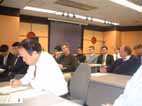Internet Business and E-Commerce in China
Stephen J. Anderson (Commercial Attache, U.S. Embassy in Beijing, China)
 Stephen Anderson talked about the opportunities and challenges facing China's E-commerce market at the seminar held at GLOCOM on January 24, 2001. Addressing the impacts of organizations outside China seeking to enter the Chinese market, Anderson pointed out that even if China is granted entry into the World Trade Organization, there may not be complete compliance with WTO requirements would come immediately. Rather, patience will be required. Dr. Anderson also noted the huge disparity between IT hardware and software sales figures in China, with $20.8 billion in hardware sales in 1999 and only $2.13 billion in software sales during the same period. The figures clearly show the impact software piracy is having on the market, and Chinese policy makers are becoming increasingly aware that they must take measures to prevent piracy if a viable domestic software industry is ever to develop. Finally, Anderson emphasized that although current Internet connection speeds in China are far lower than those in developed countries, positive trends point to an energetic, youth-driven IT and E-commerce future for China led by rapid growth in wireless applications and users. (Reported by Daniel Dolan, GLOCOM) Stephen Anderson talked about the opportunities and challenges facing China's E-commerce market at the seminar held at GLOCOM on January 24, 2001. Addressing the impacts of organizations outside China seeking to enter the Chinese market, Anderson pointed out that even if China is granted entry into the World Trade Organization, there may not be complete compliance with WTO requirements would come immediately. Rather, patience will be required. Dr. Anderson also noted the huge disparity between IT hardware and software sales figures in China, with $20.8 billion in hardware sales in 1999 and only $2.13 billion in software sales during the same period. The figures clearly show the impact software piracy is having on the market, and Chinese policy makers are becoming increasingly aware that they must take measures to prevent piracy if a viable domestic software industry is ever to develop. Finally, Anderson emphasized that although current Internet connection speeds in China are far lower than those in developed countries, positive trends point to an energetic, youth-driven IT and E-commerce future for China led by rapid growth in wireless applications and users. (Reported by Daniel Dolan, GLOCOM)
The following is a summary of the ensuing discussion:
Q: This is rather a primitive question about China's strategy. What is their manufacturing strategy? Can they build all of those 300 million telephone sets, all the net servers, and all the necessary software themselves?
ANDERSON: That is not what they have to do. There are about 80 million telephone handsets subscribers and they are adding over two million new subscribers per month. Motorola, Erickson, and Nokia, which have probably about 50% of the handset sales, plan to expand and still their capacity does not look like enough to me. Some Chinese companies are starting to build competitive handsets and increasing capacities and capabilities for computers. I think that they know how to manufacture some of these technologies, but they don't have the numbers of people to expand their capacity. Much of their basic design is to expand short messaging services capacity for the low-end market and they cannot cope with the high-end, where handsets cost about 50,000 yen (400-500 dollars). As I compare the range of devices, I find that the high-end market is dominated by foreign companies, while in the low-end market Chinese companies are doing very well. So I think at some level they will have enough, but for very good Internet information appliances, there will be shortages in demand.
Q: How about their servers and infrastructure equipment?
ANDERSON: Along with China Netcom, AsiaInfo has been in this field. They are very confident as they feel that they have huge political backing for the money they need to build infrastructure speedily. They will benefit from having more foreign involvement, although foreign involvement is very carefully controlled. So it will be an interesting balance. There have been announcements already about foreign companies that have gotten involved, such as AT&T in Shanghai.
Q: A lot of software development work is being outsourced to China and India. I am wondering if software piracy in China will have any effect when you think of outsourcing software development work to Chinese companies.
 ANDERSON: Yes. You have to be very careful. One thing that is interesting in China is that a lot of Chinese companies that are arising have extensive overseas Chinese involvement. So they are generating their revenues in the States, but they don't have a feeling for much of the leakage yet because the level of the market within China is not generating a big profit for the same type of products. I have noticed at this stage that there are a lot of these outsourcing relationships based on personal relationships, but most of the profits and most of the sales are in the States. About their piracy policy, there have been really elaborate webpages launched by the Chinese government at their propaganda organizations, and things are atrocious. It just can't work. At the same time they are talking about developing something different for the China market. There is a big push in China and they want to use India as a model to bring their software industry up. Now it is important to register your patents and trademarks, because there will be more law enforcement. So I hope it's not all bad news ANDERSON: Yes. You have to be very careful. One thing that is interesting in China is that a lot of Chinese companies that are arising have extensive overseas Chinese involvement. So they are generating their revenues in the States, but they don't have a feeling for much of the leakage yet because the level of the market within China is not generating a big profit for the same type of products. I have noticed at this stage that there are a lot of these outsourcing relationships based on personal relationships, but most of the profits and most of the sales are in the States. About their piracy policy, there have been really elaborate webpages launched by the Chinese government at their propaganda organizations, and things are atrocious. It just can't work. At the same time they are talking about developing something different for the China market. There is a big push in China and they want to use India as a model to bring their software industry up. Now it is important to register your patents and trademarks, because there will be more law enforcement. So I hope it's not all bad news
Q: I think that in China Japanese companies have not been very successful in the business field, but U.S. companies such as HP, Sun, IBM, Cisco, and Motorola are doing very well. What do you think is the main reason that U.S. companies are doing very well, while Japanese companies are not doing so well? Where do these differences come from?
ANDERSON: I guess the single thing that I believe has allowed U.S. companies to succeed globally is that we promote non-U.S. citizens to top corporate positions. To my friends in Japan, I have to say that you cripple yourself by not opening up. I have a tremendous respect for Japanese technology and I believe that Japan will always be a global technology power, but I think that your corporate structure must figure out a way to get other voices in your boardroom and listen to their views. In my presentation I showed a young Chinese face on the screen. You have to figure out a way to bring them in and the best way to do that is to make them part of the corporate team and make them part of the leadership. To me that is a real challenge for Japan. I think there has recently been a tremendous change in Japan with the involvement of foreign companies, but within your organizations you really need to understand why changing your diversity will help you in this global environment. I think that U.S. companies within China have promoted Chinese returnees, Taiwanese or Singaporeans to be their corporate leaders, and these people go back to California to make more connections in the region. There is a real contrast between U.S. organizations and their Japanese counterparts in this respect.
Q: I wonder if you could touch on possible changes, if any, in this particular field as a result of the change in the Administration in Washington D.C.
ANDERSON: There has been a lot of talk about how Clinton ignored Japan. I find that to be too much journalism, and the alliance between the U.S. and Japan is something that will outlast any administration. We share so many assumptions as developed countries, such as fundamental values, human rights, social security systems and our way to treat people and operate businesses. There will be differences in priorities, as the Clinton Administration has been very good to Internet business. I think that this administration will be fine, but their priorities may change. That is not a major sea change, maybe just more on the fringes. As far as the relationship with China, it has improved dramatically over the last 18 months. But you have to understand that there are such different types of problems from Japan. You are looking at a country that has 19th or 20th century ideas about Marxism, a Stalinist economy, and their industrial policy, while they have 21st century global companies that are savvy about technology, Nasdaq, and 21st century business. And all of these set up over what I consider most important: their Confucian personal relations or overseas Chinese relations in which it is more important to have something in common than anything else. It is this kind of very complicated human network that is very different from what we have here in the U.S.-Japan relationship.
Thank you again today for this opportunity to speak, and for your attention.
|





